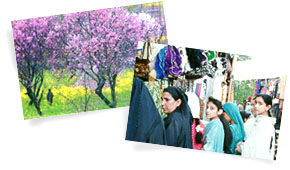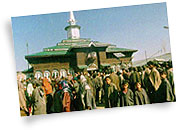
|
HOME |
NEWS |
REDIFF DIARY
|
Amberish K Diwanji |
|
By all counts, Srinagar seems perfectly fine. The streets are full of people heading for their destinations and rendezvous, the markets are busy with shopkeepers haggling with customers, the restaurants are open and thronged by both tourists and local people, including women having their weekly kitty parties. Even at nights, which can still be very cold, there is a little activity on the streets. My taxi driver in Srinagar, Mohammad Amin, tells me it is after a decade that he has used the headlights of his car. Earlier, before the sun set, most people were inside their homes while the security personnel took over the streets. The only proof that perhaps this beautiful city once faced troubled times is the overwhelming presence of policemen at on street corners. But that is a sight common to Delhi also! In fact, till the Kargil crisis broke out and the authorities shut down the airport, the city was receiving thousands of visitors daily. With tourism still one of the state's most important industries, the presence of tourists was eagerly awaited by the local people who all said in one voice that they were simply fed up of the violence created by terrorism. "In all this trouble, it is us poor people who have suffered the most. Many youngsters, for lack of jobs, took up arms, lured more by money than ideology," pointed out Amin. The government would do well to play down the war hysteria, reopen the airport to tourists and allow Kashmiris a chance to rebuild their lives and grow economically. That is the best way to fight terrorism. Amin repeatedly thanked God that he was somehow able to keep his home safe even though money was less. "Khuda ki kasam," he said, "but I never did anything wrong in all these years and for that I am grateful to Allah." Like many Kashmiris, Amin lives in a joint family which helped him and his immediate family tide over the long years of militancy.
Two years ago, if there had been a blast, all the shopkeepers would have downed shutters and gone home. Now, not one did! On the contrary, they simply ignored the blast as though it never occurred. In fact, the shopkeeper right next to place where the blast occurred, bravely said, "Every time we shut our shops, we suffer. For 10 years we have suffered but enough is enough. Now the militants can kill us, but we will not shut down and starve ourselves at home. They can do what they want, we will do what we want." Another proof, if one was needed. On a Sunday in the city, I found most of the shops shut. I asked a passer-by if there was any particular reason, and his reply was most interesting: "Now that shops remain open throughout the week, I guess everyone wants a Sunday off!" he said by way of explanation. Kashmiris are convinced that Kargil occurred because Pakistan simply failed to take Kashmir. "For 10 years they tried to take this state. In the bargain, it was the Kashmiri who suffered the most, caught between the militants and the security forces. And having failed to take Srinagar, Pakistan is now trying to take border posts," said the aforementioned Amin. Not just Amin, but scores of other people that I spoke to the city -- shopkeepers, taxi-drivers, hotel waiters and receptionists, passers-by and shoppers, army and police personnel in the state, Muslims or Hindus or Sikhs -- were all upset at Pakistan's attack on Kargil. And Kashmiris in unison have simply pooh-poohed Nawaz Sharief's claim that the intruders are Kashmiri freedom-fighters. "Why will a Kashmiri from the valley go past thousands of policemen up to the mountains to fire upon India?" asked a Kashmiri shopkeeper, "If a Kashmiri wants to create trouble, he can do it much easier right here." In fact, Kashmiris see the attack as an attempt to ruin the people financially. "For the first time after 10 years, we people had a chance of earning our money and Pakistan could not bear to see us financially independent. They just want us to stay poor so that more of us join the ranks of the militants," said a Kashmiri journalist. For a mid-sized city, Srinagar boasts an amazing number of local newspapers, both in English and Urdu. Many of these papers are just one sheet (four pages) with circulation figures that barely touch four-figures. It was the spurt in militancy that created a new industry -- newspapers and local journalists. The latter are much in demand from across the country and the world for "on the spot" reports and inputs.
Since most foreign newspapers look for journalists
in local newspapers, many people started newspapers only as
a cover. So the city boasts of Kashmir Times, Kashmir
Observer, Mirror of Kashmir, Greater Kashmir, Srinagar
Times, State Times, and so on. Running out of names, some
newspapers went a little overboard. The army PRO in
Srinagar, Major P Purshottam, gives me the weirdest name of
'em all: Bin kafan ka joolos (A funeral procession
without a coffin)! But the paper is not published.
Newspapers and the growing presence of television (along
with the invasion of the Internet in bits and pieces) is
also making Srinagarites more aware of the world around
them. A fallout of militancy is that many of the
middle-class and well-off youngsters went to other cities in
the country to study and were suddenly exposed to different
lifestyles and opportunities.
Salim, a youth I met at the
cyber café, has studied engineering in Bangalore and is now
doing an MBA. Like others his age, he dreams of either going
abroad or taking up job in one of India's metropolitan
cities. "There is no opportunity for me in Srinagar, hence
I'll have to look elsewhere," he said. But he added that if
possible, he would love to do some "big" business in
Srinagar.
Most Kashmiris today blame a few key ingredients for the
rise of militancy. Perhaps the most important was corruption
(something that still prevails extensively). "Students with
70 per cent marks were denied admission to engineering
colleges while those who had 50 per cent but were the sons
of politicians, bureaucrats or rich people all got in," said
a lecturer in Kashmir university, Srinagar, adding, "It was
such denied students who picked up the gun." Today, students
are asked to cough up to Rs 100,000 for admission to medical
or engineering colleges. Also, with a stagnant economy, jobs
were simply unavailable to many of the graduates who in turn
became extremely frustrated.
Amin told me how he had applied at least 20 times for a
driver's job in the government. "Yet, with all my
experience, I have not got the job. The officers ask for Rs
40,000 if I wanted the job. Where will I get so much money?"
he asked.
If that was one cause for starting terrorism, it was fuelled
in the early years by police brutality and the killing of
innocent men and the rape of innocent women, all of which
distanced the people from the authorities. Ironically, with
human rights pressure growing on the armed forces, killings
and rapes of innocents decreased dramatically while the
militants, who had become a law unto themselves, soon began
to perpetuate the very same crimes -- killing, raping,
extortion. Not unnaturally, the local people turned away
from the militants and began to support the army and police.
India would do well to remember the lessons. People's
expectations are rising (and this applies to the whole of
India, not just Kashmir) that need to be met. And the side
that respects human rights gets the people's support.
Senior Assistant Editor Amberish K Diwanji was recently in Srinagar en route to Leh.
|
||
|
HOME |
NEWS |
BUSINESS |
SPORTS |
MOVIES |
CHAT |
INFOTECH |
TRAVEL |
SINGLES BOOK SHOP | MUSIC SHOP | GIFT SHOP | HOTEL RESERVATIONS | WORLD CUP 99 EDUCATION | PERSONAL HOMEPAGES | FREE EMAIL | FEEDBACK |
||

 More than physical activity, it is the state of the mind
that proves that Srinagarites are no longer scared of
militants. Two weeks ago, when I was in the city, a grenade
exploded at the historic Lal Chowk in the city. Immediately,
the cops were all over the place, took away a Maruti car
which was caught in the blast that luckily killed no one.
People in the area watched with interest and then went back
to their regular activities.
More than physical activity, it is the state of the mind
that proves that Srinagarites are no longer scared of
militants. Two weeks ago, when I was in the city, a grenade
exploded at the historic Lal Chowk in the city. Immediately,
the cops were all over the place, took away a Maruti car
which was caught in the blast that luckily killed no one.
People in the area watched with interest and then went back
to their regular activities.